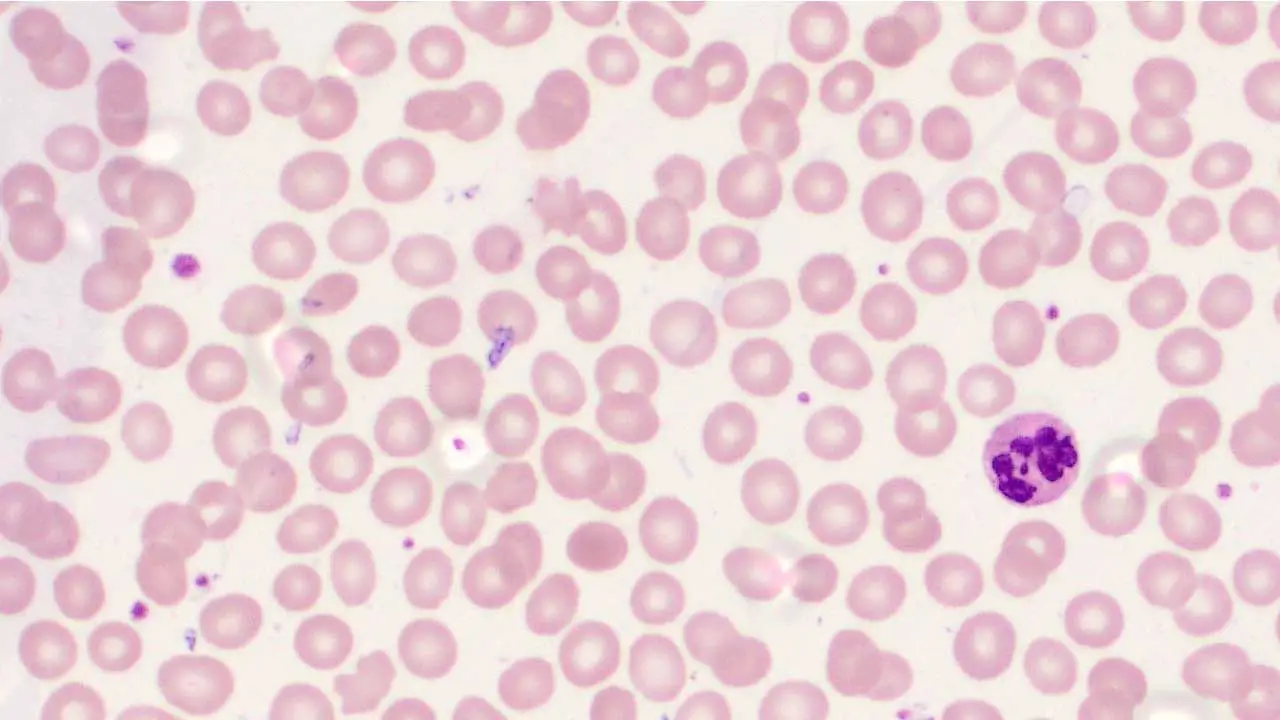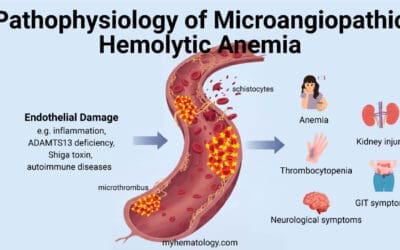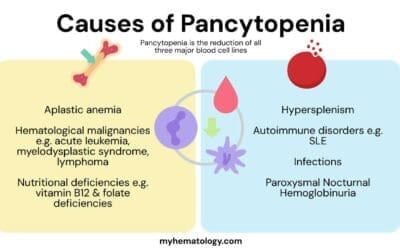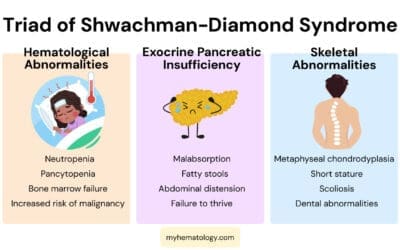TL;DR
Vitamin B12 deficiency anemia is a condition caused by a lack of vitamin B12 in the body. Vitamin B12 is essential for various bodily functions, including DNA synthesis, red blood cell production, and nervous system health.
Causes ▾: Insufficient intake (strict vegetarians/vegans) or malabsorption issues (pernicious anemia, bowel problems).
Symptoms ▾: Fatigue, weakness, anemia signs (pale skin, shortness of breath), nerve problems (numbness, tingling), mood changes, memory problems, glossitis, and angular cheilitis.
Diagnosis ▾: Clinical evaluation (history, physical exam) and laboratory tests (blood tests for B12, MMA, and CBC).
Treatment ▾: B12 replacement therapy (injections or oral supplements) and addressing the underlying cause (if possible).
Complications: Untreated deficiency can lead to serious consequences like irreversible nerve damage, dementia, and heart problems.
*Click ▾ for more information
Introduction
Vitamin B12, also known as Cobalamin, is an essential nutrient that plays a vital role in numerous bodily functions. It’s involved in DNA synthesis, red blood cell production, and maintaining a healthy nervous system. Vitamin B12, is a complex B vitamin with a unique structure containing a central cobalt atom. Being a water-soluble vitamin, our bodies don’t store large amounts, and we need regular dietary intake. However, when B12 intake is insufficient or absorption is impaired, a deficiency can develop. Vitamin B12 deficiency can lead to a variety of health problems, ranging from fatigue and anemia to neurological issues.
Causes of Vitamin B12 Deficiency
Vitamin B12 deficiency can develop due to two main reasons: insufficient intake and malabsorption.
Insufficient Intake
This is more common in individuals who follow strict vegetarian or vegan diets for an extended period. Vitamin B12 is naturally found in animal products like meat, poultry, fish, eggs, and dairy. Strict vegetarians (vegans) who exclude all animal products and don’t consume fortified foods or supplements are at greater risk.
Infants born to mothers with B12 deficiency can also be deficient at birth if they weren’t breastfed and formula wasn’t fortified with B12.
Malabsorption
Malabsorption occurs when your body is unable to absorb enough vitamin B12 from food even if you’re consuming adequate amounts. Several conditions can contribute to malabsorption:
- Pernicious anemia: This autoimmune disease attacks the stomach cells that produce intrinsic factor, a protein essential for B12 absorption. Without intrinsic factor, B12 can’t be absorbed from the small intestine.
- Atrophic gastritis: Chronic inflammation of the stomach lining can damage the cells that produce stomach acid and intrinsic factor, hindering B12 absorption.
- Small bowel resection: Surgical removal of a portion of the small intestine, where B12 absorption takes place, can significantly reduce B12 uptake.
- Crohn’s disease and celiac disease: These inflammatory bowel diseases damage the small intestine, affecting nutrient absorption, including B12.
- Other causes:
- Bariatric surgery (gastric bypass) can alter digestive anatomy and reduce B12 absorption.
- Certain medications, such as metformin for diabetes and proton pump inhibitors for heartburn, can interfere with B12 absorption in some individuals.
Additional factors that may increase the risk of B12 deficiency
- Age: As we age, stomach acid production naturally declines, which can decrease B12 absorption.
- Heavy alcohol consumption: Alcohol can damage the stomach lining and interfere with B12 absorption.
Food Groups High in Vitamin B12
While vitamin B12 is essential for many bodily functions, it’s not naturally produced by plants or animals. Instead, it’s synthesized by bacteria found in the soil and intestines of animals.
- Meat (Beef, Lamb, Pork): Rich source of vitamin B12, particularly in cuts like liver, kidney, and beef flank steak.
- Poultry (Chicken, Turkey): A good source of B12, with higher concentrations found in dark meat (chicken thighs, turkey legs) compared to white meat (chicken breasts, turkey breasts).
- Fish and Shellfish: Salmon, trout, sardines, mackerel, and clams are all excellent sources of vitamin B12.
- Eggs: Contain B12 concentrated in the yolk.
- Dairy Products (Milk, Cheese, Yogurt): Naturally contain B12 and can be a significant source for those who consume them regularly.
Pathophysiology of Vitamin B12 Deficiency
Vitamin B12 plays a crucial role in several essential cellular processes, and a deficiency disrupts these processes leading to various health problems.
Role of Vitamin B12
- DNA Synthesis: Vitamin B12 acts as a cofactor for an enzyme called methionine synthase. This enzyme is critical for converting homocysteine to methionine, a vital amino acid used in DNA synthesis and repair.
- Red Blood Cell Production: Methionine is also a precursor to S-adenosylmethionine (SAM), another crucial molecule involved in red blood cell maturation.
How B12 Deficiency Disrupts Cellular Processes
When vitamin B12 is deficient, methionine synthase activity is reduced. This leads to:
- Impaired DNA Synthesis: Without enough methionine for DNA synthesis, cells divide abnormally, leading to the production of large, immature red blood cells characteristic of megaloblastic anemia.
- Disrupted Red Blood Cell Maturation: Insufficient SAM due to B12 deficiency hinders red blood cell maturation, further contributing to anemia.
Biochemical Markers of B12 Deficiency
- Homocysteine: As methionine synthase activity is reduced, homocysteine levels rise in the blood. Elevated homocysteine can be an early indicator of B12 deficiency.
- Methylmalonic Acid (MMA): Another biochemical marker associated with B12 deficiency. Normally, vitamin B12 is needed for the conversion of propionic acid to succinyl-CoA in the mitochondria. When B12 is deficient, propionic acid accumulates and is converted to MMA, which gets excreted in the urine. Elevated MMA levels can be a more specific indicator of B12 deficiency compared to homocysteine, which can also be affected by other factors like folate deficiency.
Additional Consequences of B12 Deficiency
- Myelin Sheath Damage: Vitamin B12 functions as a cofactor in the synthesis of myelin sheath lipids, the fatty insulating layer essential for saltatory conduction of nerve impulses. B12 deficiency can lead to damage of the myelin sheath, causing neurological symptoms like numbness, tingling, and weakness.
- Impaired Neurotransmitter Production: Vitamin B12 functions as a cofactor in the synthesis of key neurotransmitters, including serotonin and dopamine. Deficiency can lead to a dysregulation of these neurotransmitters, potentially manifesting as mood disturbances, sleep problems, and in severe cases, contribute to the development of psychiatric illness.
Vitamin B12 Deficiency Symptoms and Signs
Vitamin B12 deficiency can manifest through a wide range of symptoms and signs, affecting various bodily systems. The severity and specific symptoms can vary depending on the duration and degree of the deficiency.
Hematological Manifestations
Megaloblastic Anemia: This is a characteristic finding in B12 deficiency. Due to impaired DNA synthesis, the bone marrow produces large, abnormal red blood cells that are less functional. This can lead to the following B12 deficiency symptoms:
- Fatigue and weakness
- Shortness of breath
- Pale skin
- Palpitations (feeling like your heart is racing)
Neurological Manifestations
Peripheral Neuropathy: Damage to the nerves outside the brain and spinal cord can cause the following B12 deficiency symptoms and signs:
- Numbness and tingling in the hands and feet
- Muscle weakness
- Difficulty maintaining balance and coordination
- Burning pain in the hands and feet (in severe cases)
Neuropsychiatric Manifestations
These can be subtle and develop gradually, often mistaken for other conditions. They can include the following B12 deficiency symptoms:
- Mood changes (irritability, depression)
- Memory problems and difficulty concentrating
- Confusion and disorientation
- Dementia (in severe, long-standing cases)
Oral Manifestations
- Glossitis: Inflammation of the tongue, making it appear smooth, red, and painful.
- Angular Cheilitis: Cracked sores at the corners of the mouth.

Other B12 Deficiency Symptoms
- Loss of appetite and weight loss
- Vision problems (blurry vision, in some cases)
- Hair loss
Diagnosis of Vitamin B12 Deficiency
Suspecting vitamin B12 deficiency often starts with a careful clinical evaluation, followed by specific laboratory investigations to confirm the diagnosis.
Detailed History and Physical Examination
History taking: A thorough history can provide valuable clues including
- Dietary habits: Is the patient vegetarian or vegan? Do they consume animal products regularly?
- Symptoms: Inquire about fatigue, weakness, shortness of breath, numbness, tingling, mood changes, memory problems, glossitis, or angular cheilitis.
- Medical history: Are there any underlying conditions like pernicious anemia, atrophic gastritis, or previous bowel surgery?
- Medications: Do they take metformin, proton pump inhibitors, or other medications that might affect B12 absorption?
- Physical examination: Look for signs like:
- Pale skin, jaundice (in severe cases)
- Neurologic signs: weakness, abnormal reflexes, loss of vibration sense
- Glossitis and angular cheilitis
Laboratory Investigations
Initial tests:
- Complete Blood Count (CBC): May reveal macrocytic anemia (large red blood cells) characteristic of B12 deficiency.
- Mean Corpuscular Volume (MCV): An elevated MCV can further support the suspicion of B12 deficiency.
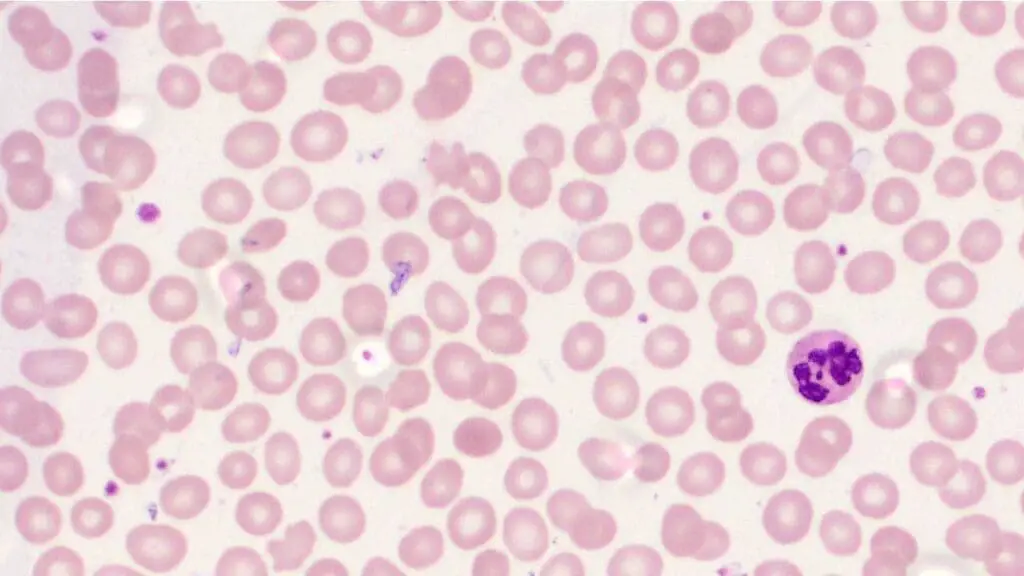
Confirmatory tests: If the initial tests suggest B12 deficiency, further investigations are needed for confirmation:
- Vitamin B12 level: Serum B12 level can be measured, but it can be unreliable in some cases.
- Methylmalonic acid (MMA) level: A more specific marker of B12 deficiency. Elevated MMA levels are a strong indicator.
- Homocysteine level: Another marker, but it can be elevated in other deficiencies like folate deficiency as well.
Additional tests (depending on suspicion)
- Schilling test: An older test that can help differentiate between various causes of B12 malabsorption. It’s less commonly used now due to its complexity.
- Serum Intrinsic Factor Level: Measured to assess if pernicious anemia (autoimmune destruction of intrinsic factor) is the underlying cause.
- Endoscopy and Biopsy: May be performed in some cases to evaluate the stomach lining for signs of atrophic gastritis.
Importance of Early Diagnosis
Early detection and treatment of B12 deficiency are crucial to prevent complications like permanent nerve damage. Vitamin B12 deficiency can sometimes be difficult to diagnose, especially in the early stages.
Vitamin B12 Deficiency Treatment
Vitamin B12 deficiency is a treatable condition. The specific treatment approach depends on the severity of the deficiency and the underlying cause.
Vitamin B12 Replacement Therapy
This is the cornerstone of treatment. Vitamin B12 can be administered through:
- Injections: The most common and effective method, especially for severe deficiency or malabsorption issues.
- Oral Supplements: May be an option for mild deficiency or for maintenance therapy after initial correction with injections. However, oral B12 may not be well-absorbed in cases of malabsorption.
Addressing the Underlying Cause
If a specific condition is causing B12 deficiency, like pernicious anemia or atrophic gastritis, treating that condition can help prevent future deficiencies.
- Medications: For pernicious anemia, injections of vitamin B12 and folic acid may be needed lifelong.
- Dietary modifications: Vegetarian and vegan individuals may need to incorporate fortified foods or B12 supplements into their diet.
- Surgery: In some cases of malabsorption due to bowel resection, surgical procedures may be considered to improve B12 absorption.
Monitoring and Follow-up
Regular monitoring is crucial to assess treatment response and prevent complications.
- Repeated B12 level and MMA level checks
- Monitoring for improvement of symptoms
Importance of Early Intervention
Early diagnosis and treatment are essential to prevent irreversible nerve damage and other complications. Even with treatment, some neurological damage might not be fully reversible.
Frequently Asked Questions (FAQs)
What are the warning signs of vitamin B12 deficiency?
Vitamin B12 deficiency can cause a wide range of symptoms, some subtle and others more obvious. Here are some warning signs to be aware of:
- Fatigue and weakness: This is a very common symptom due to the reduced oxygen-carrying capacity of red blood cells caused by B12 deficiency. People with B12 deficiency may feel constantly tired and lack energy for daily activities.
- Paresthesias (tingling and numbness): This is a characteristic symptom and often starts in the hands and feet, progressing upwards towards the legs and arms. It’s caused by damage to the nerves due to lack of B12, which is essential for nerve function.
- Balance problems: As nerve function in the legs deteriorates, individuals may experience difficulty with balance and coordination, increasing the risk of falls.
- Cognitive decline: B12 deficiency can affect memory, concentration, and overall cognitive function. In severe cases, confusion and dementia-like symptoms may develop.
- Pale skin: B12 deficiency can lead to a decrease in red blood cell production, resulting in pallor (pale skin, lips, and nail beds).
- Shortness of breath: This can occur due to anemia, as the body struggles to deliver enough oxygen to tissues.
- Glossitis (inflamed tongue): A smooth, red, and painful tongue can be a sign of B12 deficiency, though not everyone experiences this.
Can vitamin B12 deficiency cause hair loss?
Yes, vitamin B12 deficiency can contribute to hair loss. B12 plays a vital role in cell division and oxygen delivery to hair follicles. When B12 levels are low, hair growth can slow or become disrupted. This might manifest as thinning hair, increased shedding, or even premature graying. While not everyone with B12 deficiency experiences hair loss, it’s a potential sign. Addressing the deficiency with proper treatment can help improve hair health and potentially promote hair regrowth.pen_sparktunesharemore_vert
Disclaimer: This article is intended for informational purposes only and is specifically targeted towards medical students. It is not intended to be a substitute for informed professional medical advice, diagnosis, or treatment. While the information presented here is derived from credible medical sources and is believed to be accurate and up-to-date, it is not guaranteed to be complete or error-free. See additional information.
References
- Anemia: Diagnosis and Treatment (Willis, 2016).
- Management of Anemia: A Comprehensive Guide for Clinicians (Provenzano et al., 2018)
- Goldberg S, Hoffman J. Clinical Hematology Made Ridiculously Simple, 1st Edition: An Incredibly Easy Way to Learn for Medical, Nursing, PA Students, and General Practitioners (MedMaster Medical Books). 2021.
- Wang H, Li L, Qin LL, Song Y, Vidal-Alaball J, Liu TH. Oral vitamin B12 versus intramuscular vitamin B12 for vitamin B12 deficiency. Cochrane Database Syst Rev. 2018 Mar 15;3(3):CD004655. doi: 10.1002/14651858.CD004655.pub3. PMID: 29543316; PMCID: PMC6494183.
- Health Quality Ontario. Vitamin B12 and cognitive function: an evidence-based analysis. Ont Health Technol Assess Ser. 2013 Nov 1;13(23):1-45. PMID: 24379897; PMCID: PMC3874776.

